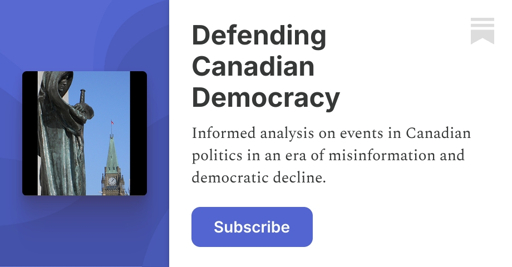As Québécois, I wholeheartedly disagree with this opinion.
Threats to national unity, principally from Quebec, have also led to further forms of decentralization. The provinces, and especially Quebec, have gained significant authority over matters traditionally belonging to the federal level, including immigration policy, and increasingly over foreign affairs matters like international trade.
Yes, and there are very good historical reasons for this. For one, we don’t want to be flooded with anglophone immigration only for the francophone population to become a minority, and suddenly losing our rights as a historical nation of this country. I don’t know how manu times I’ve heard people from the anglophone side of Canada say that we should just dissappear as a nation and just all speak English for practicality’s sake. I’m sorry that actual multiculturalism doesn’t fit with Canada’s view of “multiculturalism”.
Additionally, Québec’s more progressive values don’t always align with those of the rest of Canada. Québec has been called racist for having secularism laws, when it’s just a continuation of it’s separation of church and state following the quiet revolution, and its liberation from the grip that the catholic church had on the people and governments.
Québec is also the province with the most lakes, and the largest reserve of unsalted water, a precious resource that we want to preserve. Having Canada impose any type of oil exploitation activity over these can threaten that resource. So we’d very much like to keep control over what goes over, under or in those lakes.
Quebec’s secularism laws can be explained by looking at its history with religion, and how much religion has destroyed its society in the past.
Government secularism is a way for Quebec to ensure clerical interference in government never happens again.
Whether it should also affect individuals, and where the line between individuals and government is drawn, is a very hot topic even within Quebec.
As an outsider to interprovincial conflicts, I’m actually interested to know if the sentiment that Quebec should just become yet another anglophone province is actually widespread. I myself hadn’t heard much of such comments, but my circle is rather small, and they generally view Quebec favourably, and wish we (as in, Ontario, cause I live here) could do more together with Quebec, but is sometimes worried that they’ll be treated badly for their lack of ability to speak French properly if and when they visit. I too, in my very limited knowledge of interprovincial politics, wish that Quebec can continue to be its own province, with its own colours, cultures, influence, and politics.
That said, my impression of Canada’s multiculturalism isn’t one of assimilation, but rather one of a mosaic. But of course, that might not be true for some people (and “some” being some unknown percentage of the population), and I can understand the fear of demographic dilution; we’re literally seeing the likes of Russia and China playing this game in Ukraine, and West and Southwest China, respectively, using it as a justification to take over foreign land. But I don’t think it’s such a simple game of demographics. Quebec has put a high degree of requirement for good French proficiency to live effectively in the province, and if played properly with properly progressive policies, you can attract people who would want to defend Quebec’s status. If we’re simply rejecting anglophones because of a rejection of demographic dilution, and essentially rejecting the notion that these people may stand up for and with us, not only does that discredit us from criticizing others about assimilative multiculturalism, how are we different from racists? Having protectionist reasons doesn’t give us a free pass from racism.
And I also don’t agree with your defence of Quebec’s secularism laws. While I agree that state and religion should be separated, and yes that secularism laws should be in place, some policies that have been applied, such as the recent Bill 21, banning of hijabs and crosses in certain levels of professions, is nothing more than a gesture, to just show a facade of secularism without actually enforcing it, all while disrespecting the people practicing their religion, and essentially placing limitations on people’s cultures. Once again, we can’t preach multiculturalism while doing the exact opposite of it: erasing people of their cultural identity, even if it’s just in public. And if anything, such actions only push the influence that religions may have over civil and state affairs into the shadows, hiding behind suits and hair free of religious symbols on their bodies. I understand that Quebec’s is heavily influenced by the same secular principles practiced in France, but they seem to have a healthier take on secularism, allowing the Sikhs to continue wearing their turbans in all settings, for example. I can understand the fear of losing that balance and giving control back to religious institutions, but gestures that do not improve secularism are pointless, period, and they are much less when the side effects are similar to the very thing Quebec seems to fear happen to themselves: an erasure of their own identity.
I understand that this is a pretty sensitive topic for Québécois, and I understand that I may not have the full historical context to properly understand the viewpoints and stances of Québécois, and perhaps I’m just too firmly rooted in the viewpoint of humanism, but I find it difficult to be persuaded that the recent policies that are essentially protectionist or, even, nationalist, are helpful for Quebec’s position in public discourse, especially when it comes to criticisms from the rest of Canada, or the other way around.
All that’s to say, please enlighten me, about this threat from anglophone Canadians about essentially erasing Quebec identity, whether it’s a true threat or the amplification of a minority voice, and about how you think Bill 21 is good for Quebec and is actually progressive, and it’s not just a crude move towards secularism.
Quebec should perhaps divest itself from equalization payments in order to display its dislike of Albertan oil production, a statement that pipelines will never be allowed through Quebec. That would help decrease the tension with other provinces.
Is Alberta Being Treated Unfairly?
Much of Alberta’s frustration comes from how the equalization formula is structured. Some aspects do deserve scrutiny, such as the exclusion of certain provincial revenues, particularly from electricity generation, which disproportionately benefits Quebec. The formula could be adjusted to ensure a more accurate reflection of provincial wealth.
But Alberta’s grievances often overlook a key reality: equalization is not the only way federal dollars flow between provinces. Alberta receives significant funding through federal programs, infrastructure spending, and social transfers. The province has also benefited from federal relief efforts during economic downturns, just as other provinces have in times of crisis.
Additionally, Alberta has maintained low provincial tax rates, meaning that if the province truly wanted to receive more federal transfers, it could raise taxes to boost its eligibility. The fact that it chooses not to is a policy decision, not evidence of systemic bias.
Source: https://canadianreturnee.substack.com/p/the-truth-about-equalization-payments
Also, it’s not Alberta that pays the equalization payments to other provinces. It’s actual individual income tax. It just so happens that the most wealthy Canadians live in Alberta. And there’s a lot more at play and you can learn about it by watching ths little 6 min video.
Alberta should shut it’s pie hole and spend its money protecting against being an abandoned tailings pond, rather than on party favours for oil execs.
Arguing for centralization on a platform that has a selling point of decentralization is incredibly funny to me.
Some of the most insidious forms of decentralization have occurred at the level of politics. Provincial governments routinely engage in buck-passing and blame avoidance, attempts to pin responsibility on the federal government for matters under their own jurisdiction.
This is a significant problem but it won’t be solved by centralization. People in any organization, public, private, engage in shifting the blame on fuckups. It doesn’t matter where the real responsibility lies, as long as the audience buys the blame.
A decent chunk of his argument is simply to push back against this…loudly.
Finally, it is time to start calling out a lot of provincial grievance for the rank bullshit it often is.
Yes. And use tools they have to hold to account provincial politicians who engage in such misinformation.
I prefer a decentralized arrangement to be honest, as a BCer it’s my experience Central Canada thinks it is the center of the universe and the rest of us revolve around them. No thank you, we have very little say in this federation as it is, why would we want to weaken our standing further?






